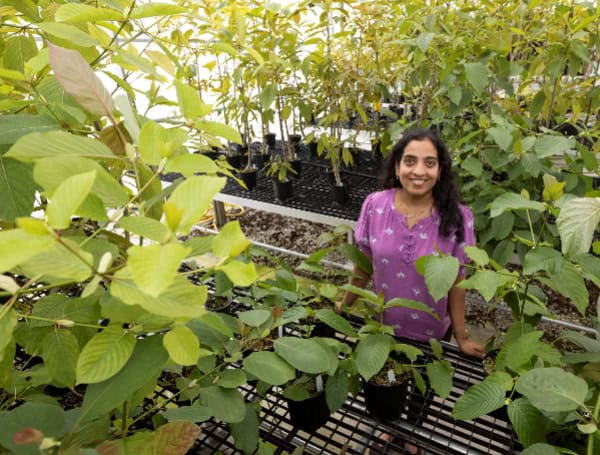The USDA National Institute of Food and Agriculture has awarded a $650,000 grant to a UF/IFAS researcher to study a plant that could help mitigate the opioid epidemic, a national health crisis responsible for more than 130 deaths each day.
Mitragyna speciosa, or kratom, is a tree belonging to the coffee family. The tree’s leaves produce unique compounds called monoterpene indole alkaloids, which are known for various beneficial pharmaceutical uses. Mitragynine, for example, has shown promise for treating pain, opioid use disorder and opioid withdrawal, and it does so without demonstrating addiction potential. Spirooxindole mitraphylline, another kratom alkaloid, is known for promoting anti-tumor activity.
Read: Agricultural Safety Center, UF/IFAS Release Heat-Related Illness Toolkit
But how kratom produces these alkaloids is unknown. Satya Swathi Nadakuduti, an assistant professor of plant biotechnology and biochemistry in the UF/IFAS environmental horticulture department, will lead a team of interdisciplinary researchers seeking to identify the genes involved and to decipher the multi-step process through which the plant produces the alkaloids. The team will do so by studying the kratom plant’s genome, gene expression and metabolites.
“Monoterpene indole alkaloids serve as an important source for potential drug discovery,” Nadakuduti said. “Understanding their biosynthesis makes it possible to support drug development, and they could meet emerging and future markets as a solution to the opioid crisis.”
Without research, the engineered production of kratom alkaloids in large quantities is not possible, which creates a bottleneck preventing advances in pharmaceutical research, she said.
Read: 2024 Winner Of Agricultural-Environmental Leadership Award In Florida Announced
Currently, there are no drug products containing kratom legally sold in the United States, and the Federal Drug Administration warns against using products made from the plant.
Some “ostensible” kratom cultivars marketed in the country have altered alkaloids, and the biological effects of their consumption depends on both the plant and the leaf development stage at harvest, Nadakuduti said. The pharmaceutical properties of these plants are either unknown or not well studied.
“Therefore, reliance on kratom products of unknown alkaloid content and questionable quality, in addition to adulteration with other psychoactive substances, has become a concern in the United States, confounding adverse effects with a potential for abuse,” she said.
Nadakuduti’s interdisciplinary team of researchers includes Christopher McCurdy, a medicinal chemist with the UF College of Pharmacy; Kelly Balmant, an assistant professor of bioinformatics with the UF/IFAS horticultural sciences department; and Thu-Thuy Dang, an assistant professor of biochemistry, molecular biology and chemistry at the University of British Columbia.
Please make a small donation to the Tampa Free Press to help sustain independent journalism. Your contribution enables us to continue delivering high-quality, local, and national news coverage.
Android Users: Download our free app to stay up-to-date on the latest news.
Connect with us: Follow the Tampa Free Press on Facebook and Twitter for breaking news and updates.
Sign up: Subscribe to our free newsletter for a curated selection of top stories delivered straight to your inbox.



